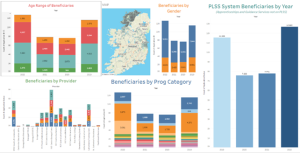Collecting Further Education and Training (FET) Service Data

Our Further Education and Training (FET) Service creates, collects and utilises a lot of data. But what does that involve and why does it do that? In this blog, FET Systems and Data Reporting Officer Anne Barron tells us more about it.
Donegal ETB’s FET Service uses a national software system called the Programme and Learner Support System or PLSS for short, to provide an integrated approach to the collection and processing of the personal data of students funded through SOLAS (the state agency which oversees further education and training in Ireland), and on the outputs, outcomes and performance of these programmes.
As the FET Systems and Data Reporting Officer, I’m involved in leading efforts to continuously improve PLSS and for establishing targets, outcomes, outputs, student tracking and reporting which supports the advancement of the FET Service locally and nationally. I’m also involved in finding useful insights in both quantitative and qualitative data to inform planning and to promote continuous improvements across the Service.
The role also looks to meet the training needs of FET staff who use PLSS and an internal project has recently begun to review processes for standardisation across the FET Service, seeking improvements that will allow us to integrate recommendations for effective use of data from our recent QQI review.
“Data is like garbage. You’d better know what you are going to do with it before you collect it” – Mark Twain
We collect learner data for a range of reasons:
- Operational – the state agency that oversees further education and training, SOLAS, is statutorily required to communicate with students and others to evaluate the FET sector in Ireland under the 2013 Further Education and Training Act. The data must establish the eligibility of students and applicants to attend FET courses and assess their employability. The data also facilitates them in meeting the demands of the labour market to coordinate and evaluate the efficiency and effectiveness of FET provision.
- Reporting – they are also obliged to report on the education/training and funding received by FET students so the data we gather helps it to ensure the FET sector meets the demands of the labour market, to coordinate an efficient FET sector in Ireland and evaluate FET outcomes. At a national and European level, they are also required to report on the FET sector by the European Social Fund (ESF) which requires each Member State to collect and store detailed data about each student in receipt of ESF co-funding (for example, students on Youthreach, adult literacy, traineeship and specific skills courses). For this, SOLAS must be able to gather evidence which it obtains from its evaluation of FET outcomes, including improved employability and the social inclusion of various groups in society (e.g. youth, females, long term unemployed, immigrants, persons with disabilities, socio-economic disadvantaged, etc.). There is also the possibility of being randomly audited by the European Commission to verify and validate Ireland’s ESF claim for funding. If ESF auditors were to make a finding of poor data or information quality, ESF co-funded provision could be suspended. This would have a serious knock-on effect on FET funding in Ireland, including a potential reduction in funding.
We are often asked if the same data is collected for all students on all courses and it is – all FET students undertaking one of our FET courses are requested to provide the same data. This means that we can report and reflect accurately on the courses we provide and are able to meet our legal obligations around auditing and funding requirements.
Another question we are often asked is who has access to the data in PLSS? SOLAS is the only agency that has access to this data and who has a complete overview of PLSS. Each ETB and FET Centre only has access to the data that it provides on PLSS. Student data is kept for the purposes of on-going administration, audit, and review, but only for as long as is necessary.
Donegal ETB is committed to ensuring that the personal data of its students are handled in accordance with the principles set out in the General Data Protection Regulation (Regulation (EU) 2016/679) and the Data Protection Acts 1988 to 2018. If you have any queries about how your Personal Data is processed, please contact Donegal ETB’s Data Protection Officer at dataprotection@donegaletb.ie.
Gathering, monitoring and reporting on all this data also requires a number of other activities:
- Liaising with appropriate staff to correlate audit information as and when required.
- Liaising with key staff across FET including the FET Director, Senior Management Team, Communications Officer, PLSS working group, Quality Assurance Support Services, Programme Development Officer and the Training Standards Team towards delivering an efficient and effective Service.
- Managing, monitoring and escalating PLSS helpdesk queries as appropriate.
- Representing Donegal ETB’s FET Service on relevant national PLSS Advisory and other stakeholder groups.
- Preparing FET corporate reports as required.
- Ensuring all key timelines and dates for submission of annual Donegal ETB statistical data are adhered to in accordance with the SOLAS overarching Planning and Funding parameters and requirements for ETBs.
- Monitoring student numbers and outcomes on an ongoing basis and reporting regularly on data gaps.
- Providing regular updates to ensure staff are fully briefed regarding the operation of PLSS including system updates.
- Utilising data from systems to prepare necessary reports tracking Donegal ETB’s FET Service performance agreement and other KPIs and communicate this information back to centres and services as directed.
- Managing the provision of relevant reports from FET systems to the FET senior management team to help inform strategic decision making, continuous improvement and planning.
- Using the data visualization tool Tableau to bring data alive visually and “to make the data dance.”

